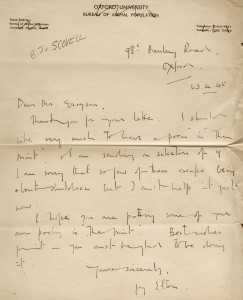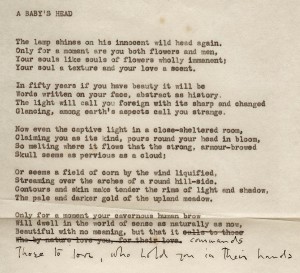The combative poet and critic Geoffrey Grigson was not known to be a great fan of female poets. He rarely reviewed their work and when he did he was invariably scathing. This refusal to be a hypocrite when confronted by poetry for which he had no enthusiasm got him into hot water with the more politically correct band of literary critics, one of whom was the Mexican poet Michael Schmidt, editor of Poetry Nation.Luckily, Schmidt’s views are not shared by most genuine lovers of poetry.

But Grigson did admire two female poets of the twentieth century—Fleur Adcock (b 1934) and E. J. Scovell (1907 – 99). Both wrote the sort of poetry that Grigson admired—visual, precise and closely observed. Scovell‘s work was particularly to Grigson’s taste and the admiration was mutual. So here is a letter dated 23 April 1945 which we at Jot HQ found interleaved in a copy of Scovell’s third collection, The River Steamer(1956), along with a carbon of ‘A Baby’s Head’. In the letter Scovell responds to Grigson’s invitation to submit a poem for publication in his new literary miscellany The Mint(1946 by sending nine poems, including presumably ‘A Baby’s Head ‘. She also apologised for the fact that ‘so few of them escape being about children’. Book, poem and letter were bought from Grigson ( see previous Jot) by the bookseller and publisher Joan Stevens, at whose death it was retrieved from her archive by us at Jot HQ. At the time Miss Scovell, who was married to Charles Elton, the animal behaviourist, was working at the Bureau of Animal Population in Oxford (this fact alone would have prompted Grigson’s interest). It seems that Grigson was impressed by the submissions , for he duly published two of the nine poems in The Mint(1946).
Reading ‘ A Baby’s Head’, which was eventually published in The River Steamer, one can easily imagine Grigson being delighted by its opening line:
‘The lamp shines on his innocent wild head again ‘.
And it gets even better:
‘Now even the captive light in a close-sheltered room,
Claiming you as its kind, pours round you head in bloom,
So melting where it flows, that the strong armour-browed
Skull seems as pervious as a cloud…’
To come across such well crafted, closely observed description at a time when neo-romantics like Dylan Thomas and George Barker were concocting what Grigson called in his scathing essay, published at this time, ‘How much me now your acrobatics amaze ‘, ‘inhuman ‘glandular’ and ‘formless poetry without the self-discipline and self-criticism which are the sources of form’, must have been a revelation to him.Until his death in 1985 Grigson never ceased in his admiration of Scovell. It is such a pity that her work is not better known today, although it is beginning to be appreciated, if the many online sites featuring her poetry are any indication. [RMH]


That’s a welcome light thrown on the poetry of E.J. Scovell and Grigson’s approval. He also admired Freda Downie.